The Harvard Board of Overseers is one of the University’s two governing boards, working alongside the President and Fellows (also known as the Corporation), Harvard’s principal fiduciary board. Formally created in 1642, the Board of Overseers has for decades included 30 members elected annually by Harvard degree holders to staggered six-year terms. The Board directs the visiting committee process, Harvard’s principal means for external academic review of its wide range of Schools and departments. The Overseers also counsel the University’s leadership on a range of priorities and plans, and they have the power to consent to certain actions such as the appointment of new Corporation members.
Starting July 1, Harvard degree holders will have the opportunity to vote either online or by paper ballot for new members of the Board of Overseers, as well as elected directors of the Harvard Alumni Association (HAA). The roster of candidates was announced earlier this year, before the election was delayed from spring to summer in response to the COVID-19 pandemic. Completed ballots must be received by 5 p.m. (EDT) on Aug. 18.
More so than many such boards, Harvard’s Board of Overseers brings together alumni with a remarkable range of backgrounds, experiences, perspectives, and professional expertise. Its recent ranks have included distinguished figures from higher education, government, nonprofits, business, finance, the arts, science, medicine, technology, law, journalism, and other fields. “What brings us together is a dedication to Harvard, a belief in the importance of education and research, and a commitment to thinking about how universities and our graduates can best serve society,” said Martin Chávez, the Board’s incoming president. “Given the huge challenges and profound changes now facing the country and the world, including higher education, we’ll do everything in our power to help.”
“Each of us brings something distinctive to the conversation, and we all learn from one another,” said Beth Karlan, incoming vice chair of the board’s executive committee. “My own perspective is that of a clinician-scientist and a caregiver, and I’m particularly interested in working with University leaders to support students’ personal transformations and to promote wellness — especially in these challenging times. In the end, I believe the role of the Overseers is about serving the institution as a whole and strengthening its capacity to make a positive difference in the world.”
Drawing on interviews over the course of several months, the following is a brief look at some members of the current board: Martin Chávez ’85, S.M. ’85; Paul Choi ’86, J.D. ’89; Philip Hart Cullom, M.B.A. ’88; Meredith “Max” Hodges ’03, M.B.A. ’10; Marilyn Holifield, J.D. ’72; Ketanji Brown Jackson ’92, J.D. ’96; Beth Karlan ’78, M.D. ’82; and John B. King Jr. ’96.
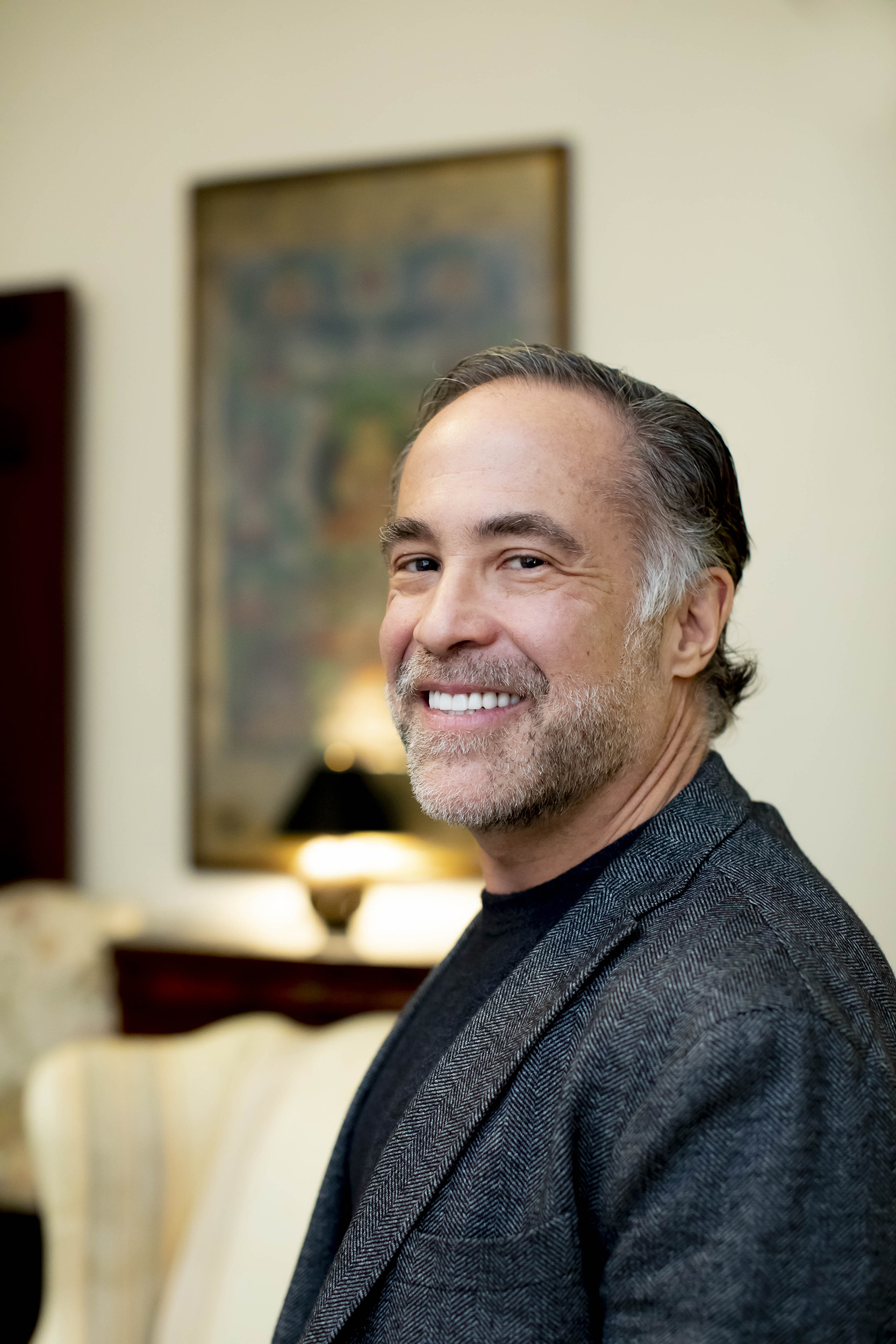
In the era of the coronavirus, the world needs the kind of vision that drives Martin Chávez.
Working at the intersection of technology, entrepreneurship, and finance, he has a fascination with using data, mathematics, software, and machine learning to solve complex problems. He uses the example of bringing a new drug to the market — a complicated process that can take years of testing, trials, and approvals — to make his case for how creative uses of technology can enhance people’s lives.
“What if those tests and trials could be done virtually, in a computer simulation, with the same results? If we can do that, it’s going to unleash huge transformations,” said Chávez, who co-founded two software companies early in his career, then went on to become chief technology officer, chief finance officer, co-chair of the Americas Diversity Committee, and global co-head of securities at Goldman Sachs before retiring from the firm in December.
A love of numbers and encouragement from his parents, particularly his father, who told him that “computers were the future,” fueled his early interest in programming. A skilled math student, Chávez began taking classes at the University of New Mexico and hanging out at the school’s computing lab. Soon he was “hogging the family phone for hours,” connecting through a modem to the Arpanet — an early computer network and the precursor to the internet — and collaborating with a group of software engineers at Massachusetts Institute of Technology.
When it came time for college, Chávez was drawn to MIT but was also drawn to the liberal arts. Advice from an English teacher who told him “You will be a computer scientist, but this is your big opportunity to be more than that” helped him choose Harvard.
On campus Chávez explored the humanities but chose to become a biochemistry concentrator on the advice of a professor who convinced him freshman year that “the future of biochemistry and molecular biology is computational.” Later on, Harry Lewis’ class CS 121 introduced him to theoretical computing. “It was love at first sight,” said Chávez. “It was by far the most beautiful area of knowledge that I had ever encountered.”
But the beauty of theoretical computing and computer science in general held an added, personal appeal. “At that time I knew I knew I was gay, but I hadn’t said it to anybody,” said Chávez. “And I remember thinking, ‘Wow, if the father of computer science Alan Turing could be gay, maybe this is a good field for me.’”
Chávez earned a master’s degree in computing while completing his undergraduate studies and won a national computing competition with two classmates for creating a mathematical model for how the nation of Zaire could construct a strategic stockpile of cobalt.
“All these experiences showed me the power of bringing math and computer science together in the applied world to solve a particular problem,” said Chávez.
In addition to his love for computers, Chávez brought his drive to excel and his commitment to transparency to his life and work after Harvard. He credits his parents for pushing him to always try his best.
“We’re resolutely proud of our colorful and complicated Spanish, Basque, Jewish, Mexican heritage. And my parents would always say, ‘To get half as far, you’re going to have to work twice as hard because you’re Hispanic. So what? No complaining. Just get busy.’”
At Goldman, Chávez got busy pushing the company’s leaders to embrace social issues and become more transparent with investors and clients by sharing the company’s data and software tools as a way to build trust and more business.
“People thought I was some combination of a zealot, crazy, wrong, naïve, or maybe onto something that would work, only 100 years from now. But by the time I retired, just about everybody agreed with me.”
Transparency played a key role in Chávez’s first encounter with Harvard’s Board of Overseers years ago when he met with them as an undergraduate representative. “They made it clear they wanted to know the truth — they really wanted to get to the bottom of things that were working, things that were not working, and things that we could be doing differently.”
Today, as the board’s incoming president, Chávez considers himself “extraordinarily lucky to be able to help lead such an incredibly talented, hard-working group of people devoted to Harvard and to asking hard questions.”
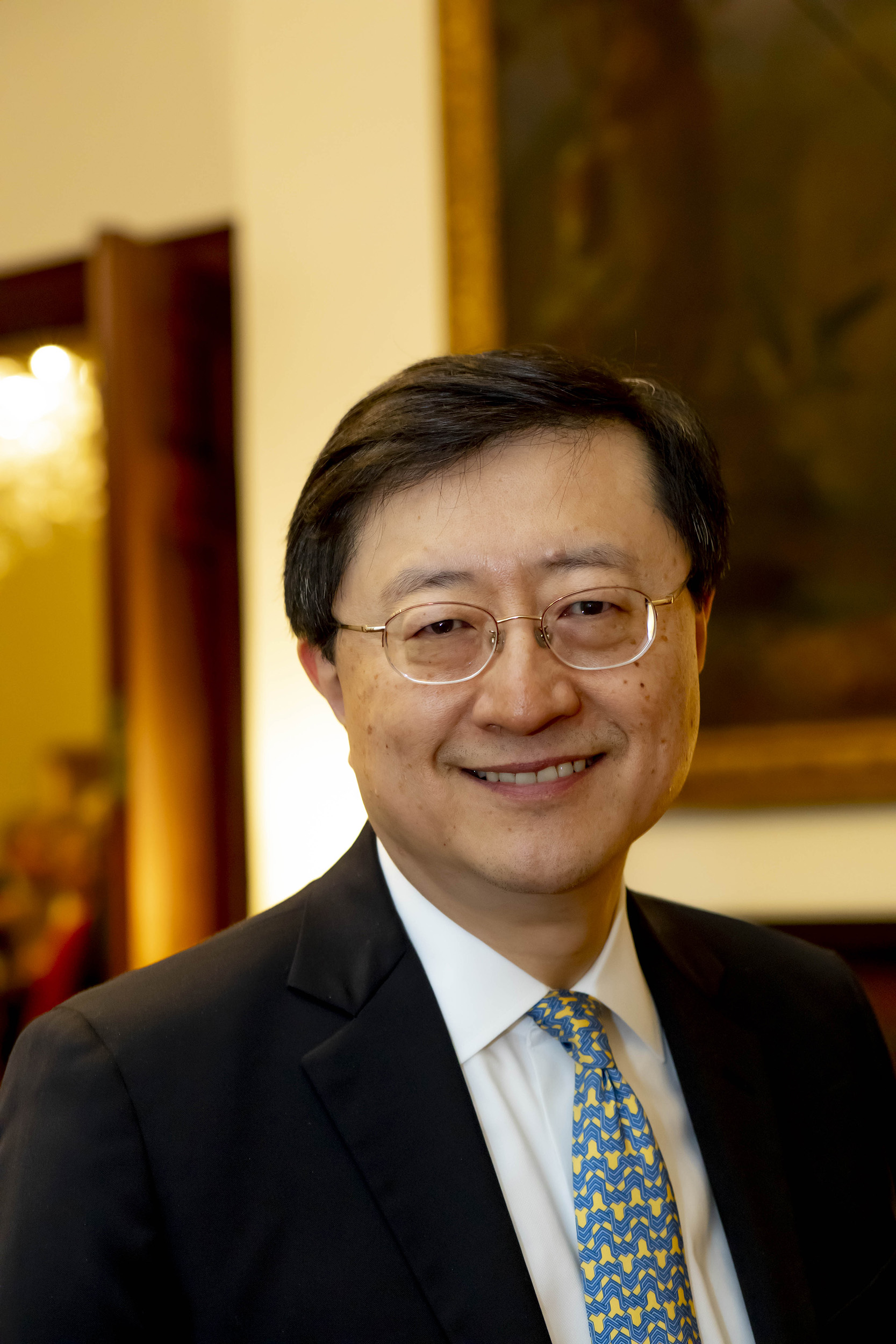
It’s safe to say the Harvard experience has been life-defining for Paul Choi, a partner at Sidley Austin LLP, where he is a member of his firm’s executive committee and global co-head of its mergers and acquisitions practice. Born in Seoul, South Korea, he grew up in Chicago and Milwaukee and was poised to follow his father into medicine until Harvard set him on a different path.
Choi admits he applied to the College in part “because of its reputation” and remembers arriving on campus in 1982 feeling slightly overwhelmed. “I didn’t know anyone. I didn’t know what a House was,” he recalled. “People started talking about a concentration, and I had to figure out what they meant. I was intimidated by the place and its history, the amazing faculty and students.”
But that fear didn’t last.
“My Harvard experience completely changed the direction of my life,” said Choi, who has been deeply involved with the Harvard community for many years working to strengthen ties among alumni across different classes and Schools. “I thought I was going to be a doctor, and it turned out that I really had a strong interest in the social sciences. So I studied economics and then went on to Harvard Law School, where I learned an approach to problem-solving, an approach to thinking through issues and their consequences, and trying to come up with the best answer.
“Harvard really did change the direction of my life professionally. And personally, I was blessed with lifelong friends. It sounds cliché, but it really was a transformative experience for me, and I’ve always been enormously grateful to Harvard for that.”
Choi said he became interested in the social sciences because he was “intrigued by a lot of the problems that social science and economics were trying to solve.” During his Harvard time he was involved in public service, working with students from the Cambridge public schools. He polished his writing and management skills as an editor with the Harvard Crimson, and later the Harvard Law Review. A resident of North House (now Pforzheimer House), Choi recalls being initially disappointed by the Radcliffe Quadrangle assignment. Like his early fear of Harvard, his disappointment was short-lived.
“Fast forward three years later, and I think you would be hard-pressed to find a group of seniors more satisfied with House life,” said Choi. “That’s because of the wonderful group of tutors and faculty deans, who were so caring and delightful to be around, and the wonderful community that existed in our House.”
Building Harvard community has been one of the hallmarks of Choi’s life post-Harvard College and HLS. A longtime alumni interviewer, former president of the Harvard Club of Chicago, and reunion leader for his College and Law School classes, he was elected by his fellow alumni to the HAA Board of Directors in 2009. Following a term as elected director, Choi held numerous executive positions for the HAA, serving as president in 2015–16. During his HAA presidency he introduced a review process that led to changes in the board’s structure and workflow, and he sought to create further networks between alumni and undergraduates.
“After I graduated, I discovered the pleasure of meeting with fellow alumni and spending time with them,” said Choi. “Staying in touch with the University that gave me so much became a deep interest of mine. By the time I became president of the Alumni Association, I was literally traveling around the world meeting and connecting with members of the Harvard community.
“I found each of those meetings, wherever I was in the world, to be really energizing, because I would see the enthusiasm that alumni have for staying connected to Harvard and to one another. It was a delight to be president because I got to witness firsthand how passionate people are about Harvard and their time there.”
While promoting alumni engagement was central to his work with the HAA, Choi sees his role as an Overseer in a slightly different light.
“One of the main objectives is how we can promote and strengthen academic excellence at the University. When I look through the list of the 30 Overseers, I’m struck by the extraordinary talent and diversity that exists in that group, and it’s just a tremendous privilege to be part of it. I think we are all very much united in that mission, to promote academic excellence and to bring the diversity of that talent and that experience in service to the University to provide our best advice and counsel.”

For the past four decades, both at sea and on land, retired U.S. Navy Vice Admiral Philip Cullom has woven together his passion for science, leadership, and innovation to help protect the world, drive invention, and inspire future generations of leaders in a time of global change.
He lives by the code of honor, servant leadership, and a motto that he took from his time at the U.S. Naval Academy: “History will judge you for how you treat others.” There’s a measured calm in his voice when he speaks, the result of years in high-pressure positions where people’s lives, the fate of peace, and the health of the planet were all at risk.
Cullom’s distinguished military career includes participation in nine named operations supporting U.S. military efforts in the Middle East, Mediterranean, Adriatic, Caribbean and Western Pacific, along with the operational commands of two 8,000-member carrier strike groups. He also served as director of the Navy’s Fleet Readiness Division, director of the Energy and Environmental Readiness Division, and deputy chief of naval operations for Fleet Readiness and Logistics. During his long tenure, Cullom helped overhaul the Navy’s energy infrastructure, introduce sweeping technological change, and draft several key national and maritime security policies, including the country’s National Security Strategy for a Global Age, while serving on the National Security Council.
Cullom grew up in Flossmoor, Ill., where his uncle, who conducted Navy escort duty during World War II, sparked his nephew’s fascination with a career at sea. In high school, the astronomer J. Allen Hynek, who helped lead the U.S. Air Force’s study of unidentified flying objects, fueled Cullom’s interest in science and in questioning the unknown. “He left us with all the great principles of science that encourage you to develop a hypothesis and then prove it right or prove it wrong, or to be honest enough to say you don’t know,” he said.
Cullom graduated with a degree in physics from the Naval Academy and enrolled in the Navy’s nuclear power program, eventually serving as an engineer on nuclear-powered cruisers and aircraft carriers and moving up the ranks. But while an instructor at a nuclear prototype at the Idaho National Engineering Laboratory, he was stunned by the cost of replacement parts. Eager to help the Navy save money, he took a two-year leave of absence to attend Harvard Business School (HBS).
“I can certainly remember many of the things that I learned in physics or in engineering, but they are not nearly as vivid as the memories I have of the learning that I accomplished at Harvard Business School,” he said. “I remember the case studies so vividly and how much I learned from my classmates.”
After receiving his HBS degree, he returned to command posts at sea for several years, completed a stint at the Pentagon doing strategy and policy-related work for the chief of naval operations, and he took a job at the White House as the director for Defense Policy and Arms Control for the National Security Council. In September 2001, Cullom had just left Washington for a post at a Navy base in Tennessee when a plane slammed into the Pentagon, killing many of his friends and colleagues. “I made a commitment that day that I would stay on active duty until the Navy no longer needed me,” said Cullom, who would go on to command a group of cruisers, destroyers, frigates, and amphibious ships that helped secure the Al-Faw Peninsula during the Iraq War.
Whether in times of conflict or peace, Cullom considers humility the key to great leadership.
“Always remember you are serving others for the good of the organization, be it a medical practice, a university, a nonprofit, a law firm, or the Navy,” he said. “If you keep the goals and the ideals of that mission paramount, then you’ll do the right thing, and never put your own interests above everyone else’s.”
Cullom’s leadership skills were as important on the bridge of a ship as they were in an office setting. In charge of fleet readiness in D.C, he headed two Navy-wide task forces on energy and innovation. Like all great CEOs, he embraced new ideas. He attached stern flaps to make ships more hydrodynamic and reduce fuel costs; he added a motor to a destroyer’s engine that reduced its reliance on gas turbines; he experimented with biofuel and the 3D printing of replacement parts; and he encouraged all of his sailors to come up with suggestions, even hosting “Shark Tanks” to speed those ideas to adoption by the fleet. His efforts reduced costs and harmful emissions and established important new paradigms.
Today, Cullom’s interest in innovation and alternative energy informs his current work as an entrepreneur experimenting with graphene, an ultrathin material made of a single layer of carbon that’s stronger than steel. And the power of bringing an interdisciplinary lens to technological challenges informs his ongoing work with Harvard.
“The 21st century is about interdisciplinary learning, and that’s what I see happening across the University,” said Cullom. Getting people from a range of different disciplines together to tackle some of society’s most pressing challenges, he added, “is what’s going to change the world.”
“I am honored to be able to be a part of that process in my role as an Overseer, to serve as a Socratic steward of the University,” he said, “and to bring my background and my experience and expertise to bear on that process.”
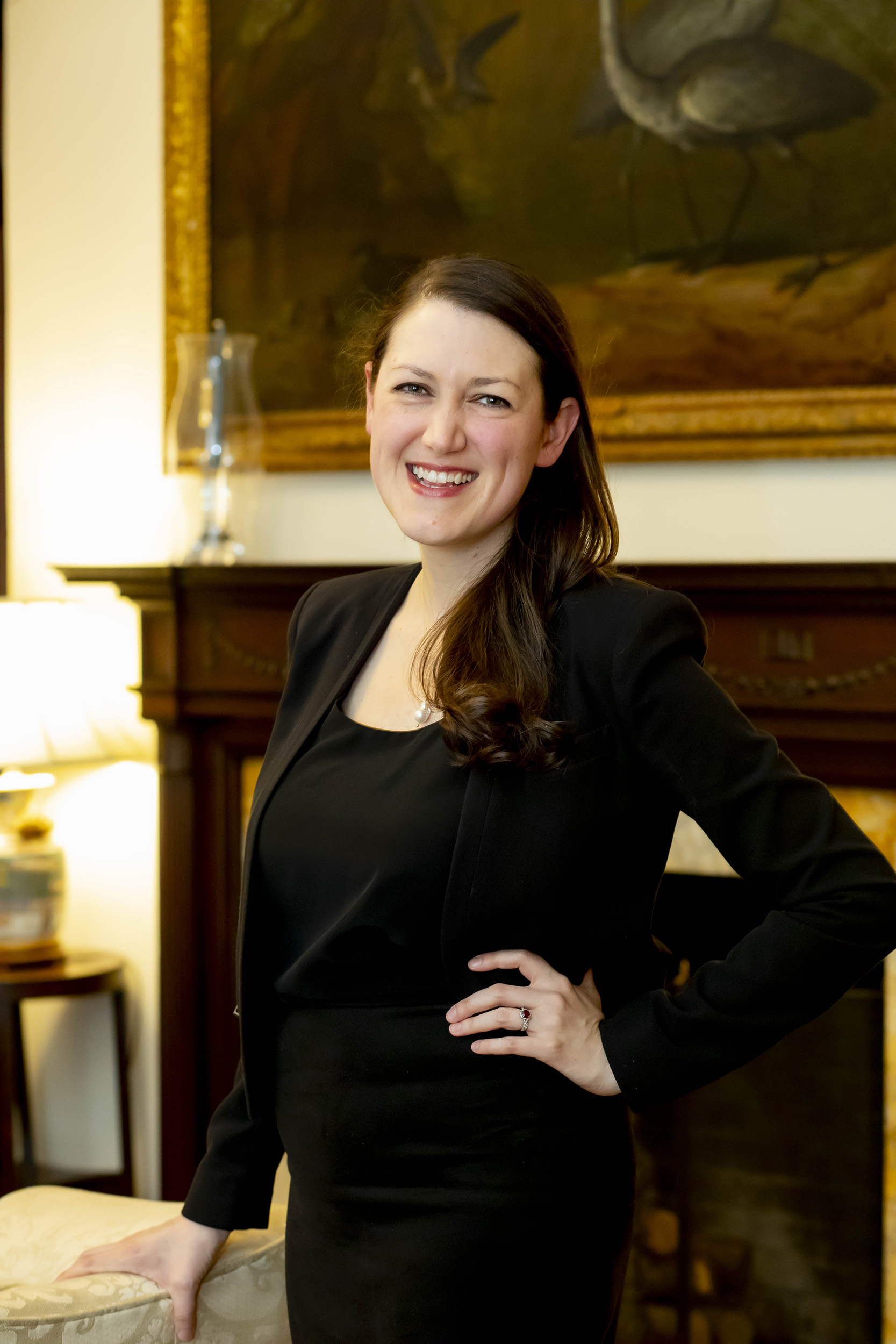
Meredith “Max” Hodges almost convinced herself Harvard Business School (HBS) wasn’t the right fit. The Harvard College grad knew she wanted a career as an arts leader, but she wasn’t sure HBS could help her get there.
“I was worried that going to Harvard Business School would be rejoining a path I had deliberately stepped away from,” said Hodges, who left a consulting firm in the mid-aughts to work in finance for the Museum of Modern Art (MoMA) in New York. As she struggled with her decision, MOMA’s chief financial officer, an HBS alum, offered her some critical advice: Don’t overthink it.
“He told me, ‘You want to run things, and there is a school for running things.’”
The fit, in the end, was the perfect one for Hodges, who has been executive director of Boston Ballet for nearly six years.
“Every class at HBS was applicable to what I do now, in the same way that with a liberal arts education every class expands your scope of thinking, expands your understanding and appreciation of the world. Everything in the classroom becomes relevant to who you are, and to shaping you as a leader,” said Hodges. “That was really true at the College, and at HBS.”
Education and the arts were important influences for Hodges, who grew up on Long Island, the child of teachers who instilled in her a drive to excel at school along with a deep passion for the arts. “The arts were part of the richness of life, in my parents’ point of view,” Hodges said, “and they certainly passed it on to me.”
Like so many freshmen who arrive on campus with a sterling transcript, Hodges soon understood that while she had been a standout student in high school, at Harvard she was just one among many academic stars. “Suddenly, you have to crystallize what else there is that is special about you, and that was an extraordinary experience, coming up with what else defined me besides just being a good student.”
Hodges immersed herself in Harvard’s vibrant arts scene. As an undergraduate, she helped run City Step, a public service organization that uses dance to teach Cambridge school students self-expression and self-esteem; she played saxophone with the Harvard Band; and she embraced every theater and musical theater opportunity she could find.
“The arts were my answer to the question, ‘Who else are you?’” she said.
At Boston Ballet, Hodges is committed to growing and diversifying audiences as well as expanding opportunities for and training women choreographers. “We deeply believe that for ballet to be relevant we need to be producing ballets by a wide range of voices, and women are traditionally underrepresented in terms of who is creating works that major ballet companies are performing.”
Hodges calls her time as an Overseer “extraordinary” and refers to her peers on the board as “some of the most brilliant, thoughtful, and articulate people I have ever had the pleasure of encountering.” She likes that they don’t shy away from difficult topics during their meetings, and she calls it a “privilege to be part of hard and respectful conversations where people are persuading or being persuaded with open minds, evidence, and with thoughtful dialogue.”
It’s easy to draw a direct parallel between Hodges’ work with Harvard’s Board of Overseers and one of her favorite campus memories. She loves thinking back on her nights in Pennypacker dorm freshman year surrounded by her roommates with the door to their common room ajar “so that anyone could swing by and talk.”
“I’ll never forget those evenings of talking and exchanging ideas with my new best friends who I am still so close with today, and that open door,” she said.
Given her Harvard experience, it seems only natural that supporting new art and art-making and ensuring the arts door is open for everyone is what drives Hodges today.
“I am deeply, deeply committed to the creation of new boundary-breaking art that helps us make sense of the human experience, and I am equally committed to expanding and growing the audiences for that art,” she said. “I think access to the arts is a human right and part of what makes this world work.”
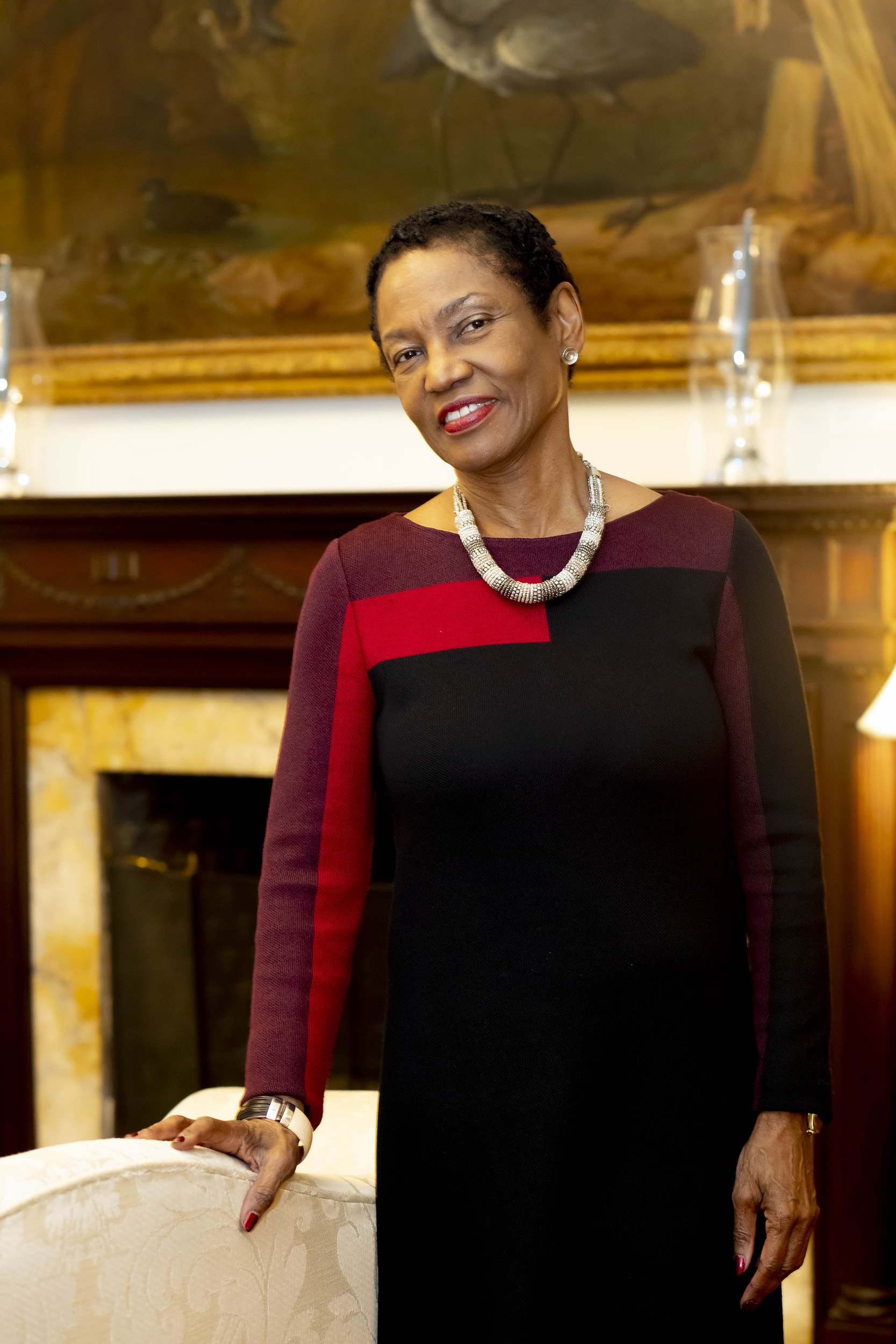
Marilyn Holifield is passionate about mentoring young lawyers, drawing on her long career in corporate law, on challenges she’s faced, and on life lessons learned to offer them advice and suggestions.
“I love nudging young people,” said Holifield, a partner at Holland & Knight LLP, where she has worked for the past 40 years. “I love being able to nudge someone from another generation in a certain direction and get them to say, ‘Oh, I never thought about that.’”
Holifield credits her family with helping her think differently. Growing up in Tallahassee, Fla., she remembers hearing about how her relatives defended their 500-acre farm in Mississippi from the Ku Klux Klan and being inspired by her parents, who were devoted to making a difference. “I grew up not only with the sense that it was important to take a stand,” said Holifield, “but that it was important to participate in a full way in what our country has to offer.”
Holifield’s father studied under the great agricultural scientist George Washington Carver at what is now Tuskegee University and became a soil conservationist for the U.S. Department of Agriculture and the first black federal conservation agent in the state of Florida. Her mother graduated as one of only a few black students in a nursing program at Boston City Hospital and, after moving to Florida, successfully petitioned the Tallahassee school board to create the first licensed practical nursing program for black students.
“The core of who I am,” said Holifield, “comes from their strong spirit, courage, and bravery.”
Her parents supported peaceful desegregation in the South and the Civil Rights work of Martin Luther King Jr. Emboldened by their efforts, Holifield helped desegregate her local high school in 1963. It was a trying experience, she recalled, but it was also eye-opening.
“In my view, many of the white students lost their humanity by being so hateful to me and the other black students,” said Holifield. “Even today it’s astonishing to me, and it’s why I’ve always felt it so important to recognize the humanity in people and to do things that encourage others to recognize the humanity of anyone considered an outsider.”
A gifted teenage pianist and poet, Holifield thought her adult life would involve the stage or the written word. But at Swarthmore she majored in economics at the urging of an older brother. At the advice of another brother who was graduating from Harvard Law School, she applied to HLS.
“He always thought I was a clear thinker, because of the way we would argue,” said Holifield. “And he knew I had the discipline because I had mastered the techniques needed to beat him and my other brother and a lot of other boys on the swim team.”
Later, her brother, who graduated from HLS, secured an internship with the U.S. Commission on Civil Rights. His experience convinced her she could “use the law to effect change.” Her first job out of Law School was with the NAACP Legal Defense and Educational Fund to implement Civil Rights law.
Reflecting on her Harvard time, Holifield said the deep friendships she cultivated in Law School helped her navigate the challenges of corporate law and diversify the face of corporate America.
“At that time, very few black lawyers had been successful in major corporate law firms in urban areas and certainly not in Florida. And the real reason so many minorities struggle in climbing the next rung on the ladder to equity partnership has to do with the capacity of that person to generate business,” said Holifield. “My Harvard friends sent me clients, and I did the same, and that network really helped me become successful.”
Her Harvard networking never stopped. Holifield has held a range of positions with alumni committees and organizations since graduating from HLS. She has been an elected director and served on the board of the Harvard Alumni Association, is a former co-chair of the Harvard Global Month of Public Service and is the current at-large director of the Harvard Club of Miami.
She considers her work as an Overseer an “extraordinary opportunity to assist the University in being better.” It’s also offered her “a broader perspective, a greater awareness, and far more sensitivity to the vastness of the resources of Harvard on one hand, and to the complexities of the role of Harvard in higher education, in our society, and in our lives.”
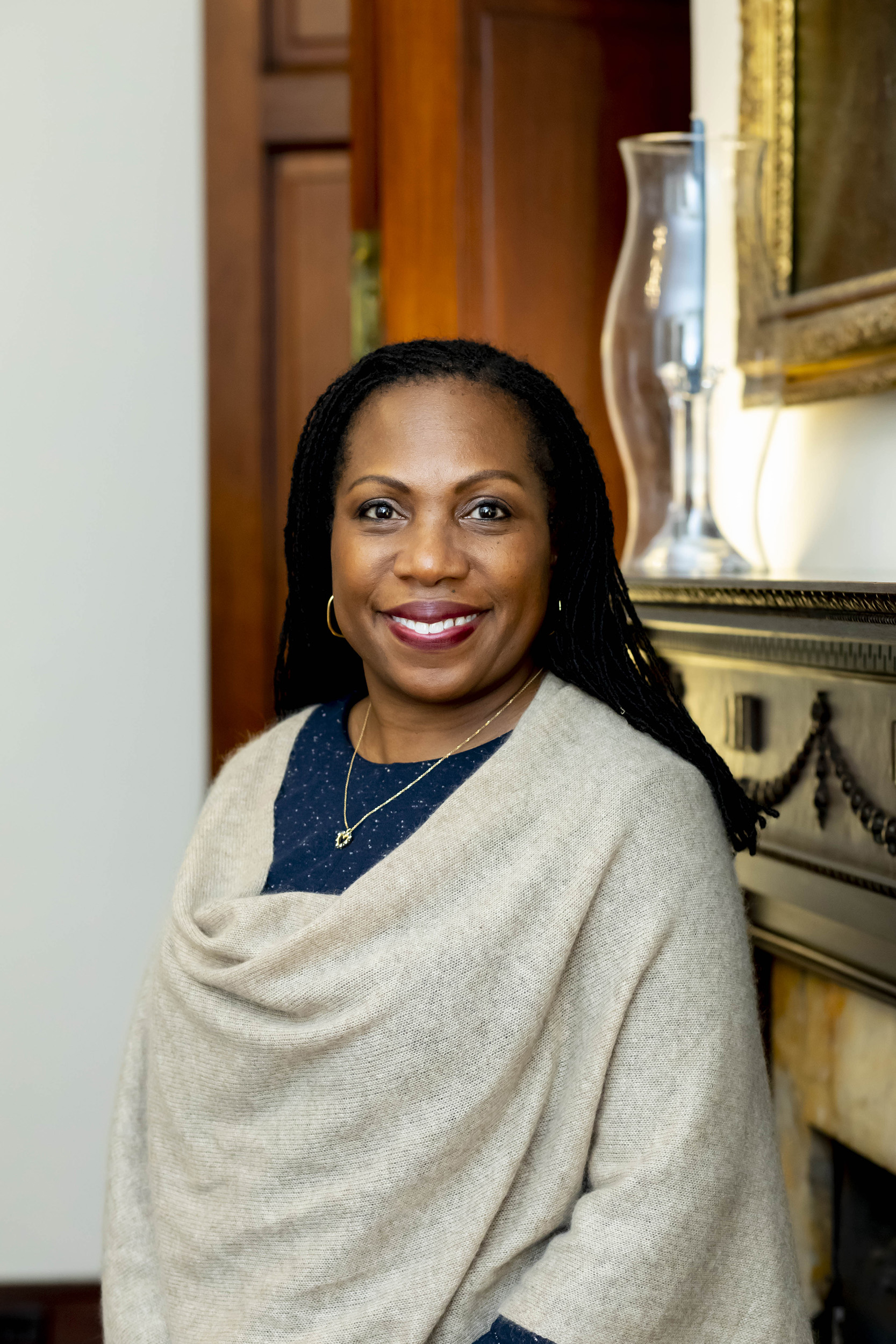
Judge Ketanji Brown Jackson’s initial visit to Harvard came long before college was even on her radar. She first traveled to Cambridge for a national high school debate competition held at the University each year. But even then, the Crimson energy was palpable for the speech champion, who was born in D.C. and raised in Miami, where she attended public schools.
“The University is so majestic,” Jackson said, “and the lure of Harvard that attracts so many people came to me a little earlier.”
During her freshman year, Michael Sandel’s course “Justice,” which asks students to grapple with difficult ethical questions, left a lasting impression. “Professor Sandel’s class was a marvel,” said Jackson. “The kinds of questions that he was asking overlapped with philosophy and law. It was just really, really formative, and I think it set a path for me.”
Upholding the principles of justice and fairness has been key to Jackson’s career. She has served as a judge for the U.S. District Court for the District of Columbia since 2013.
“I am passionate about making sure that people who are powerless in our society and are being mistreated are heard by the system and are able to get their grievances heard and are treated fairly,” said Jackson. “Fairness on a fundamental level, no matter who you are, no matter how much money you have or how little money you have or whatever your circumstances, is crucial and is at the core of who we are and who we should be as a society.”
A strong writer, Jackson gravitated toward the humanities as an undergraduate and concentrated in government because she “wanted to do something practical.” She planned to become a lawyer like her father and was accepted to Harvard Law School, but took a gap year to explore the world of journalism, working as a researcher and reporter for Time magazine. Harvard eventually drew her back, but writing would figure prominently in her Law School years and her career. At HLS Jackson spent most of her non-class time serving on the Harvard Law Review, where the experience of crafting legal arguments helped affirm her interest in litigation work.
Clerkships after Law School with judges on both the federal district court and appeals court levels taught her “a lot about legal analysis,” she said, as did her time as a clerk for Justice Stephen Breyer, LL.B. ’64 of the U.S. Supreme Court. “It’s stressful work because the stakes are so high,” said Jackson of her work with Breyer. “But it was also just awe-inspiring every day.”
For Jackson, the transition from lawyer to judge was made easier by her time working on policy issues for the U.S. Sentencing Commission. “Trying to figure out what the right result is versus the result that favors your client” was great preparation for a seat on the bench, she said. Reflecting on her career, Jackson said she considers being a judge more difficult in many ways than practicing law.
Jackson tells the students she mentors that as a lawyer, “You start with the answer, ‘My client wins.’ Then you work backwards from there to support that answer with case law and arguments. As a judge you are neutral to begin with and you are trying to get it right,” she said. “You are trying to answer the questions in the way that makes the most sense in terms of the law, and that is most consistent with our core constitutional values.”
As a judge Jackson said she is honored to have been “entrusted with the duty and the responsibility of trying to do your best to enunciate the principles of law and apply them to the facts that are before you and to reach the right results.”
Jackson loved her time as an elected director of the Harvard Alumni Association and didn’t hesitate when asked to stand for nomination to the Board of Overseers. She considers her job with the governing body her “service to the University that gave me so much.”
“I feel like I grew up at Harvard as an undergraduate, and obviously Harvard made me a lawyer. I spent a lot of time in Cambridge, and met my husband at the College. I feel like my life would have been totally different without Harvard’s guidance and intervention, and I want to do everything I can to give back.”
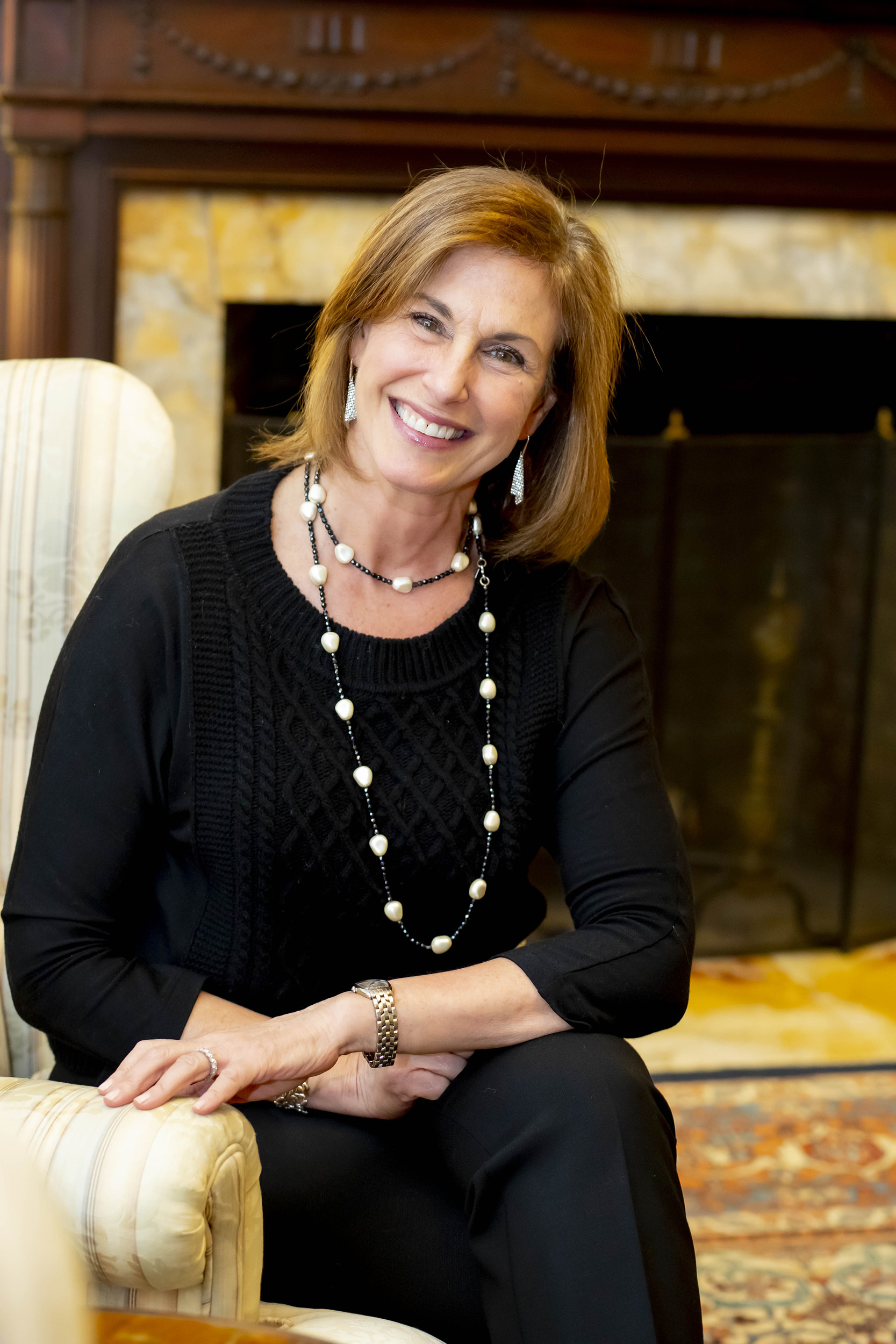
For Beth Karlan, “Failure is not an option.”
It’s a fitting mantra for the self-described optimist, a physician and scientist who reminds herself each day to always try to do a little better than she did the day before and never shies away from a challenge, even when pressed to take the easier, more accepted path.
Recalling some of those hurdles in her early life and career, Karlan, a pioneer in ovarian cancer research and treatment, acknowledges that 40 years ago sexist attitudes about the role of women in society and medicine were firmly entrenched.
Fortunately for women everywhere, Karlan paid no attention.
When she was contemplating applying to Harvard, a high school guidance counselor urged her to “reconsider.” Karlan became the first person from her high school to go to Harvard, graduating from the College magna cum laude in 1978. Not long after, when she called home with the news that she’d been accepted to Harvard Medical School, her mother told her: “I sent you to Harvard to marry a doctor, not to be a doctor.” Karlan graduated with her medical degree in 1982. While inquiring about having her fiancé, then studying medicine at UCLA, transfer to Harvard so they could be together, an administrator warned her that the man she planned to spend the rest of her life with might be simply using her to gain access to the elite medical school. Karlan and her husband will celebrate their 40th wedding anniversary this year.
The defining challenge of Karlan’s life came while she was a medical student visiting a patient suffering with ovarian cancer in a Boston hospital. The young woman, not much older than Karlan, asked her bluntly: “What right do you have to be pursuing your dreams while I lie here dying?”
“I was taken aback,” said Karlan, “but it was a challenge and a gauntlet that I picked up.” Throughout her career the native New Yorker has devoted her life to studying the disease, researching and understanding its genetic properties, and developing early detection methods and targeted treatment that can help patients live longer, fuller lives.
“My work has been about understanding the genetic clustering of cancer in families and how the risk of it can be a genetic trait,” said Karlan, who directs the UCLA Johnson Comprehensive Cancer Center’s Cancer Population Genetics program. “I have been working on the BRCA genes since before they were identified and looking at ways to prevent cancers, ways to better target and treat those cancers. I’ve embraced that gauntlet and have been trying to recruit some of the smartest minds and energetic colleagues to take up the fight along with me because collaboration is the only way to tackle this.”
At Harvard, Karlan loved the arts and helped run the Lowell House Opera. (She met her future husband when she persuaded him to help her fix the lighting during a rehearsal.) But she loved science too, and the drive to help others, instilled in her by her parents, was strong. She said her Harvard time, both while an undergraduate and a medical student, taught her “perseverance and the ability to listen deeply and listen well and learn from others.”
Today Karlan brings those lessons with her to work every day, and to her role as Harvard Overseer.
“I wake up every day grateful for the gifts I’ve been given personally, and I think about how to pay that forward and make the world a better a place,” she said. “That is part of my role on the Overseers, affecting the Harvard community in a way that can allow us to train this next generation of future leaders. And having those interactions with that incredible group of people on the governing boards enriches me and my life.”
Pressing forward as a cancer clinician and researcher is not always easy, but ever the optimist, Karlan focuses on the positive.
“I take hope from fighting the battle every day, and from the selflessness of women who want to participate in clinical trials. I have seen enormous improvement in how we not only allow people to live longer but also live so much better. And I get hope in seeing how people’s lives can be transformed for the better despite this diagnosis.”
In part, she said her hope comes from “recognizing your mortality.”
“That recognition challenges you to make the most of every day. Life is not a dress rehearsal, so you need to live it to the fullest and embrace the opportunity to leave the world a bit better by contributing to those around you.”
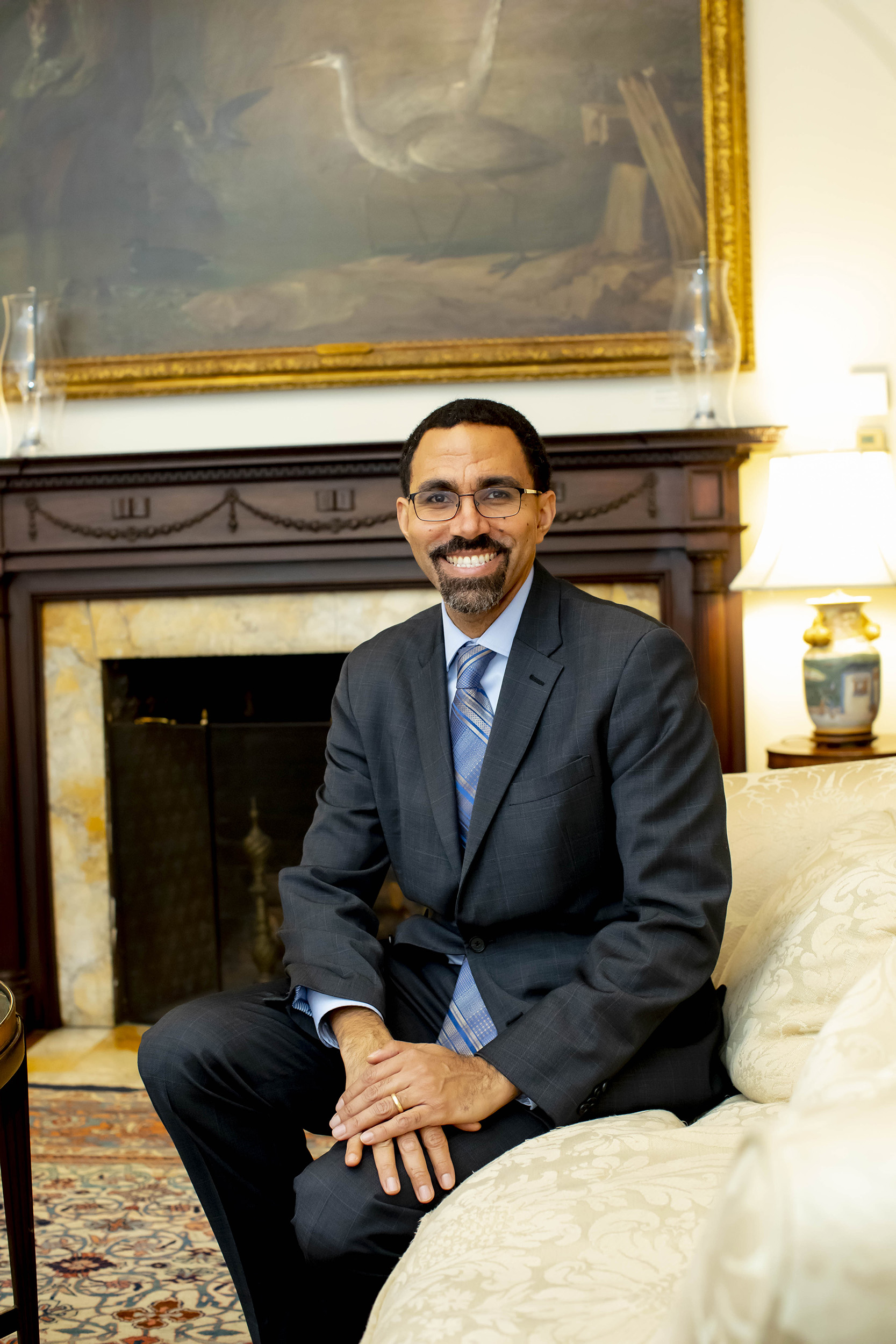
John B. King Jr. knows education rescued him, so he’s used that knowledge throughout his life to help lift up the lives of countless others.
A teacher, former U.S. Secretary of Education, and the current president and chief executive of The Education Trust, a nonprofit devoted to closing the opportunity gap for low-income students and students of color, King has made it his lifelong mission to make quality education a right for everyone.
“I was blessed to have extraordinary public education experiences that saved my life and gave me incredible opportunities that shaped my life today,” said King, who graduated from Harvard magna cum laude in 1995 (although he matriculated with the Class of ’96). “I want to make sure that kind of experience is available to all kids in every community regardless of race or income or ZIP code or the language that they speak at home or their immigration status. That is what drove me as a teacher and that’s what drives me now.”
School was an escape for King, whose childhood was marred by tragedy. His mother died from a heart attack when he was 8. Not long after, his father’s undiagnosed Alzheimer’s worsened. “I didn’t know why he was acting the way he was, angry, sad, confused,” said King, who lived at home alone with his father and who began to take on more responsibilities to keep the household going. “It was just this incredibly hard period, and school was so important as a respite and a refuge.”
A favorite elementary school teacher who took King and his classmates to the ballet and to art museums, had them perform Shakespeare, and read The New York Times in class left a lasting impression. “It was a wonderfully enriching academic experience, but there was also this really important sense of belonging in that classroom,” King recalled. “That was the only place that I could be a kid, because I couldn’t be a kid at home.”
Like many children who have experienced trauma, King “got into a lot of trouble.” Expelled from high school as a junior, he moved to New Jersey to live with his aunt and uncle and finish his senior year. When a guidance counselor encouraged him to aim high, King listened, setting his sights on Harvard after hearing an African American undergraduate speak during a College recruiting trip. “It was a good example of the fact that representation matters,” said King. “His visit helped drive my interest in Harvard because I could really relate to him.”
In Cambridge, the Phillips Brooks House Association and service played pivotal roles for King during his Harvard time. When not in class, King could be found working with PBHA, teaching civics and conflict resolution in local public schools and running a summer camp in Boston’s Mission Hill neighborhood. “That experience really changed my trajectory,” said King. “I didn’t think I would go into education. I thought I would go to law school. But I loved my time with PBHA and decided to become a teacher.”
Teaching and administrative jobs in Boston followed. While principal of what would become the state’s highest-performing urban public middle school, located in Roxbury, King felt the thrill of “making a tangible difference” as he watched his students’ progress, and a growing desire to “scale the work.” He began pursuing his doctoral degree in education at Teachers College, Columbia University, while he was a principal, but he never forgot his experience of interning at the U.S. Department of Education after his first year of teaching. As he reflected on that work King realized law school would help him “think about the policy change necessary to address the education equity issues that were driving me.”
King worked to build a network of high-performing charter schools while at Yale Law School. Later, he took on a senior role at the New York State Education Department and ultimately became the commissioner of education for New York State. King went on to serve as U.S. Secretary of Education in the latter part of the Obama administration. “It was an amazing experience, continuing to work on the education equity issues that I care so much about with the president and a fantastic team of committed public servants,” said King.
That work continues today for King both in his professional role and as a Harvard Overseer.
“It felt like such an important way to give back to the institution that meant so much to me,” said King of his decision to run for the governing board. “And it also felt like an opportunity to influence the University’s direction and how the University uses its extraordinary voice and profile in the education sector to lead.”
The Daily Gazette
Sign up for daily emails to get the latest Harvard news.
"current" - Google News
June 17, 2020 at 12:10AM
https://ift.tt/30PgbqP
Eight current Overseers share their unique stories - Harvard Gazette
"current" - Google News
https://ift.tt/3b2HZto
https://ift.tt/3c3RoCk
Bagikan Berita Ini

















0 Response to "Eight current Overseers share their unique stories - Harvard Gazette"
Post a Comment